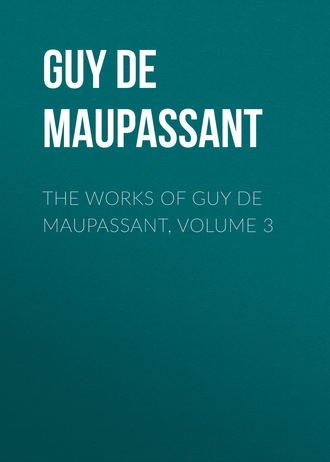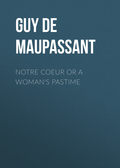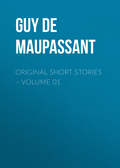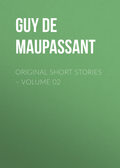
Ги де Мопассан
The Works of Guy de Maupassant, Volume 3
She limped with her right leg, and in her brown, knitted jacket, that was faded by the sun, and washed out by the rain, she looked like a poor, wretched, dirty servant.
"Here is Mamma," the child said.
When she got close to the house, she looked at the strangers angrily and suspiciously, and then she went in, as if she had not seen them. She looked old, and had a hard, yellow, wrinkled face, one of those wooden faces like country people so often have.
Monsieur d'Apreval called her back.
"I beg your pardon, Madame, but we came in to know whether you could sell us two glasses of milk."
She was grumbling when she reappeared in the door, after putting down her pails.
"I don't sell milk," she replied.
"We are very thirsty," he said, "and Madame is old and very tired. Can we not get something to drink?"
The peasant woman gave them an uneasy and cunning glance, and then she made up her mind.
"As you are here, I will give you some," she said, going into the house, and almost immediately the child came out and brought two chairs, which she placed under an apple tree, and then the mother in turn brought out two bowls of foaming milk, which she gave to the visitors. She did not return to the house, however, but remained standing near them, as if to watch them and to find out for what purpose they had come there.
"You have come from Fécamp?" she said.
"Yes," Monsieur d'Apreval replied, "we are staying at Fécamp for the summer."
And then after a short silence he continued:
"Have you any fowls you could sell us, every week?"
The woman hesitated for a moment, and then replied:
"Yes, I think I have. I suppose you want young ones?"
"Yes, of course."
"What do you pay for them in the market?"
D'Apreval, who had not the least idea, turned to his companion:
"What are you paying for poultry in Fécamp, my dear lady?"
"Four francs, and four francs, fifty centimes," she said with her eyes full of tears, and the farmer's wife, who was looking at her askance, in much surprise, asked:
"Is the lady ill, as she is crying?"
He did not know what to say, and replied with some hesitation:
"No … no … but she lost her watch as we came, a very handsome watch, and that troubles her. If anybody should find it, please let us know."
Mother Benedict did not reply, as she thought it a very equivocal soft of answer, but suddenly she exclaimed:
"Oh! here is my husband!"
She was the only one who had seen him, as she was facing the gate. D'Apreval started, and Madame de Cadour nearly fell, as she turned round suddenly on her chair.
A man who was bent nearly double and who was panting for breath, was there, ten yards from them, dragging a cow at the end of a rope; and without taking any notice of the visitors, he said:
"Confound it! What a brute!"
And he went past them, and disappeared in the cow-house.
Her tears had dried quickly, as she sat there startled, without a word, and with the one thought in her mind, that this was her son, and d'Apreval, whom the same thought had struck very unpleasantly, said in an agitated voice:
"Is this Monsieur Benedict?"
"Who told you his name?" the wife asked, still rather suspiciously.
"The blacksmith at the corner of the highroad," he replied, and then they were all silent, with their eyes fixed on the door of the cow-house, which formed a sort of black hole in the wall of the building. Nothing could be seen inside, but they heard a vague noise, movements, and footsteps and the sound of hoofs, which were deadened by the straw on the floor, and soon he reappeared in the door, wiping his forehead, and went towards the house with long, slow strides. He passed the strangers without seeming to notice them, and said to his wife:
"Go and draw me a jug of cider; I am very thirsty."
Then he went back into the house, while his wife went into the cellar, and left the two Parisians alone.
"Let us go, let us go Henri," Madame de Cadour said, nearly distracted with grief, and so d'Apreval took her by the arm, helped her to rise, and sustaining her with all his strength, for he felt that she was nearly falling down, he led her out, after throwing five francs onto one of the chairs.
As soon as they were outside the gate, she began to sob, and said, shaking with grief:
"Oh! oh! is that what you have made of him?"
He was very pale, and replied coldly:
"I did what I could. His farm is worth eighty thousand francs, and that is more than most of the children of the middle classes have."
They returned slowly, without speaking a word. She was still crying; the tears ran down her cheeks continually for a time, but by degrees they stopped, and they went back to Fécamp, where they found Monsieur de Cadour waiting dinner for them, and as soon as he saw them, he began to laugh, and exclaimed:
"So my wife has had a sunstroke, and I am very glad of it. I really think she has lost her head for some time past!"
Neither of them replied, and when the husband asked them rubbing his hands:
"Well, I hope that at least you have had a pleasant walk?"
Monsieur d'Apreval replied:
"A delightful walk, I assure you; perfectly delightful."
A NIGHT IN WHITECHAPEL
My friend Ledantec and I were twenty-five and we had come to London for the first time in our lives. It was a Saturday evening in December, cold and foggy, and I think that all that combined is more than enough to explain why my friend Ledantec and I were most abominably drunk, though, to tell the truth, we did not feel any discomfort from it. On the contrary, we were floating in an atmosphere of perfect bliss. We did not speak, certainly, for we were incapable of doing so, but then we had no inclination for conversation. What would be the good of it? We could so easily read all our thoughts in each others eyes! And all our thoughts consisted in the sweet and unique knowledge, that we were thinking about nothing whatever.
It was not, however, in order to arrive at that state of delicious, intellectual nihility, thai we had gone to mysterious Whitechapel. We had gone into the first public-house we saw, with the firm intention of studying manners and customs, – not to mention morals, – there as spectators, artists and philosophers, but in the second public-house we entered, we ourselves became like the objects of our investigations, that is to say, sponges soaked in alcohol. Between one public-house and the other, the outer air seemed to squeeze those sponges, which then got just as dry as before, and thus we rolled from public-house to public-house, until at last the sponges could not hold any more.
Consequently, we had for some time bidden farewell to our studies in morals, and now they were limited to two impressions: zig-zags through the darkness outside, and a gleam of light outside the public-houses. As to the inhibition of brandies, whiskies and gins, that was done mechanically, and our stomachs scarcely noticed it.
But what strange beings we had elbowed with during our long stoppages! What a number of faces to be remembered, what clothes, what attitudes, what talk and what rags!
At first we tried to note them exactly in our memory, but there were so many of them, and our brain got mixed so quickly, that at present we had no very clear recollection of anything or anybody. Even objects that were immediately before us appeared to us in a vague, dusky phantasmagoria and got confounded with precious objects in an inextricable manner. The world became a sort of kaleidoscope to us, seen in a dream through the penumbra of an aquarium.
Suddenly we were aroused from this state of somnolence, awakened as if by a blow in the chest, and imperiously forced to fix our attention on what we saw, for amidst this whirl of strange sights, one stranger than all attracted our eyes and seemed to say to us: "Look at me."
It was at the open door of a public-house. A ray of light streamed into the street through the half-open door, and that brutal ray fell right onto the specter that had just risen up there, dumb and motionless.
For it was indeed a specter, pitiful and terrible, and, above all, most real, as it stood out boldly against the dark background of the street, which it made darker still behind it!
Young, yes; the woman was certainly young; there could be no doubt about that, when one looked at her smooth skin, her smiling mouth which showed her white teeth, and firm bust which could be plainly noted under her thin dress.
But then, how explain her perfectly white hair, not gray or growing gray, but absolutely white, as white as any octogenarian's?
And then her eyes, her eyes beneath her smooth brow, were surely the eyes of an old woman? Certainly they were, and of a woman one could not tell how old, for it must have taken years of trouble and sorrow, of tears and of sleepless nights, and a whole long existence, thus to dull, to wear out and to roughen those vitreous pupils.
Vitreous? Not exactly that. For roughened glass still retains a dull and milky brightness, a recollection, as it were, of its former transparency. But her eyes seemed rather to have been made of metal, which had turned rusty, and really if pewter could rust I should have compared them to pewter covered with rust. They had the dead color of pewter, and at the same time, they emitted a glance which was the color of reddish water.
But it was not until some time later that I tried to define them thus approximately by retrospective analysis. At that moment, being altogether incapable of such an effort, I could only establish in my own mind the idea of extreme decrepitude and horrible old age, which they produced in my imagination.
Have I said that they were set in very puffy eyelids, which had no lashes whatever, and on her forehead without wrinkles there was not a vestige of eyebrow? When I tell you this, and considering their dull look beneath the hair of an octogenarian, it is not surprising that Ledantec and I said in a low voice at the sight of this woman, who was evidently young:
"Oh! poor, poor old woman!"
Her great age was further accentuated by the terrible poverty that was revealed by her dress. If she had been better dressed, her youthful looks would, perhaps, have struck us more, but her thin shawl, which was all that she had over her chemise, her single petticoat which was full of holes, and almost in rags, and which did not nearly reach to her bare feet, her straw hat with ragged feathers and with ribbons of no particular color through age, it all seemed so ancient, so prodigiously antique!
From what remote superannuated, abolished period did they all spring? One did not venture to guess, and by a perfectly natural association of ideas, one seemed to infer that the unfortunate creature herself, was as old as her clothes were. Now, by one, I mean by Ledantec and myself, that is to say, by two men who were abominably drunk and who were arguing with the special logic of intoxication.
It was also under the softening influence of alcohol that we looked at the vague smile on those lips with the teeth of a child, without stopping to reflect on the beauty of those youthful teeth, and seeing nothing except her fixed and almost idiotic smile, which no longer contrasted with the dull expression of her looks, but, on the contrary, strengthened them. For in spite of her teeth, it was the smile of an old woman in our imagination, and as for me, I was really pleased at the thought of being so acute when I inferred that this grandmother with such pale lips, had the set of teeth of a young girl, and still, thanks to the softening influence of alcohol, I was not angry with her for this artifice. I even thought it particularly praiseworthy, since, after all, the poor creature thus carried out her calling conscientiously, which was to seduce us. For there was no possible doubt about the matter, that this grandmother was nothing more nor less than a prostitute.
And then, drunk! Horribly drunk, much more drunk than Ledantec and I were, for we really could manage to say: "Oh! Pity the poor, poor old woman!" While she was incapable of articulating a single syllable, of making a gesture, or even of imparting a gleam of promise, a furtive flash of allurement to her eyes. With her hands crossed on her stomach, and resting against the front of the public-house, with her whole body as stiff as if she had been in a state of catalepsy, she had nothing alluring about her, except her sad smile, and that inspired us with all the more pity because she was even more drunk than we were, and so, by identical, spontaneous movement, we each of us seized her by an arm, to take her into the public-house with us.
To our great astonishment she resisted, sprang back, and so was in the shadow again, out of the ray of light which came through the door, while, at the same time, she began to walk through the darkness and to drag us with her, for she was clinging to our arms. We followed her without speaking and without knowing where we were going, but without the least uneasiness on that score. Only, when she suddenly burst into violent sobs as she walked, Ledantec and I began to sob in unison.
The cold and the fog had suddenly congested our brains again, and we had again lost all precise consciousness of our acts, of our thoughts and of our sensations. Our sobs had nothing of grief in them, but we were floating in an atmosphere of perfect bliss, and I can remember that at that moment it was no longer the exterior world which seemed to me as if I were looking at it through the penumbra of an aquarium; it was I myself, an I composed of three, which was changing into something that was floating adrift in something, though what it was I did not know, composed of palpable fog and intangible water, and it was exquisitely delightful.
From that moment I remember nothing more until what follows, and which had the effect of a clap of thunder on me, and made me rise up from the bottom of the depth to which I had descended.
Ledantec was standing in front of me, his face convulsed with horror, his hair standing on end and his eyes staring out of his head, and he shouted to me: —
"Let us escape! Let us escape!" Whereupon I opened my eyes wide, and found myself lying on the ground, in a room into which daylight was shining. I saw some rags hanging against the wall, two chairs, a broken jug lying on the floor by my side, and in a corner a wretched bed on which a woman was lying, who was no doubt dead, for her head was hanging over the side, and her long white hair reached almost to my feet.
With a bound I was up, like Ledantec.
"What!" I said to him, while my teeth chattered: "Did you kill her?"
"No, no," he replied. "But that makes no difference; let us be off."
I felt completely sober by that time, but I did think that he was still suffering somewhat from the effects of last night's drunk; otherwise, why should he wish to escape? while the remains of pity for the unfortunate woman forced me to say: —
"What is the matter with her? If she is ill, we must look after her."
And I went to the wretched bed, in order to put her head back on the pillow, but I discovered that she was neither dead nor ill, but only sound asleep, and I also noticed that she was quite young. She still wore that idiotic smile, but her teeth were her own and those of a girl. Her smooth skin and her firm bust showed that she was not more than sixteen; perhaps not so much.
"There! You see it, you can see it!" Ledantec said. "Let us be off."
He tried to drag me out, and he was still drunk; I could see it by his feverish movements, his trembling hands and his nervous looks. Then he implored me and said: —
"I slept beside the old woman; but she is not old. Look at her; look at her; yes, she is old after all!"
And he lifted up her long hair by handfuls; it was like handfuls of white silk, and then he added, evidently in a sort of delirium, which made me fear an attack of delirium tremens: "To think that I have begotten children, three, four children. Who knows how many children, all in one night! And they were born immediately, and have grown up already! Let us be off."
Decidedly it was an attack of madness. Poor Ledantec! What could I do for him? I took his arm and tried to calm him, but he thought that I was going to try and make him go to bed with her again, and he pushed me away and exclaimed with tears in his voice: "If you do not believe me, look under the bed; the children are there; they are there, I tell you. Look here, just look here."
He threw himself down, flat on his stomach, and actually pulled out one, two, three, four children, who had hidden under the bed. I do not exactly know whether they were boys or girls, but all, like the sleeping woman, had white hair, the hair of an octogenarian.
Was I still drunk, like Ledantec, or was I mad? What was the meaning of this strange hallucination? I hesitated for a moment, and shook myself to be sure that it was I.
No, no, I had all my wits about me, and I in reality saw that horrible lot of little brats; they all had their faces in their hands, and were crying and squalling, and then suddenly one of them jumped onto the bed; all the others followed his example, and the woman woke up.
And then we stood, while those five pairs of eyes, without eyebrows or eyelashes, eyes with the dull color of pewter, and whose pupils had the color of red water, were steadily fixed on us.
"Let us be off! let us be off!" Ledantec repeated, leaving go of me, and at that time I paid attention to what he said, and, after throwing some small change onto the floor, I followed him, to make him understand, when he should be quite sober, that he saw before him a poor Albino prostitute, who had several brothers and sisters.
COUNTESS SATAN
I
They were discussing dynamite, the social revolution, Nihilism, and even those who cared least about politics, had something to say. Some were alarmed, others philosophized, while others again, tried to smile.
"Bah!" N – said, "when we are all blown up, we shall see what it is like. Perhaps, after all, it may be an amusing sensation, provided one goes high enough."
"But we shall not be blown up at all," G – the optimist, said, interrupting him. "It is all a romance."
"You are mistaken, my dear fellow," Jules de C – replied. "It is like a romance, but with that confounded Nihilism, everything seems like one, but it would be a mistake to trust to it. Thus, I myself, the manner in which I made Bakounine's acquaintance …"
They knew that he was a good narrator, and it was no secret that his life had been an adventurous one, so they drew closer to him, and listened religiously. This is what he told them.
II
"I met Countess Nioska W – , that strange woman who was usually called Countess Satan, in Naples; I immediately attached myself to her out of curiosity, and I soon fell in love with her. Not that she was beautiful, for she was a Russian who had all the bad characteristics of the Russian type. She was thin and squat, at the same time, while her face was sallow and puffy, with high cheek bones and a Cossack's nose. But her conversation bewitched every one.
"She was many-sided, learned, a philosopher, scientifically depraved, satanic. Perhaps the word is rather pretentious, but it exactly expresses what I want to say, for in other words, she loved evil for the sake of evil. She rejoiced in other people's vices, and liked to sow the seeds of evil, in order to see it flourish. And that on a fraud, on an enormous scale. It was not enough for her to corrupt individuals; she only did that to keep her hand in; what she wished to do, was to corrupt the masses. By slightly altering it after her own fashion, she might have adopted the famous saying of Caligula. She also wished that the whole human race had but one head; but not in order that she might cut it off, but that she might make the philosophy of Nihility flourish there.
"What a temptation to become the lord and master of such a monster! And I allowed myself to be tempted, and undertook the adventure. The means came unsought for by me, and the only thing that I had to do, was to show myself more perverted and satanical that she was herself. – And so I played the devil.
"'Yes,' I said, 'we writers are the best workmen for doing evil, as our books may be bottles of poison. The so-called men of action, only turn the handle of the mitrailleuse which we have loaded. Formulas will destroy the world, and it is we who invent them.'
"'That is true,' she said, 'and that is what is wanting in Bakounine, I am sorry to say.'
"That name was constantly in her mouth, and so I asked her for details, which she gave me, as she knew the man intimately.
"'After all,' she said, with a contemptuous grimace, 'he is only a kind of Garibaldi.'
"She told me, although she made fun of him as she did so, about his Odyssey of the barricades and of the hulks which made up Bakounine's legend, and which is, nevertheless, only the exact truth; his part of chief of the insurgents, at Prague and then at Dresden; his first death sentence; about his imprisonment at Olmütz and in the casemates of the fortress of St. Peter and St. Paul; in a subterranean dungeon at Schüsselburg; about his exile to Siberia and his wonderful escape down the river Amour, on a Japanese coasting-vessel by way of Yokohama and San Francisco, and about his final arrival in London, whence he was directing all the operations of Nihilism.
"'You see,' she said, 'he is a thorough adventurer, and now all his adventures are over. He got married at Tobolsk and became a mere respectable, middle-class man. And then, he has no individual ideas. Herzen, the phamphleteer of Kolokol inspired him with the only fertile phrase that he ever uttered: Land and Liberty! But that is not yet the definite formula, the general formula; what I will call, the dynamite formula. At best, Bakounine would become an incendiary, and burn down cities. And what is that, I ask you? Bah? A second-hand Rostopchin! He wants a prompter, and I offered to become his but he did not take me seriously.' …
"It would be useless to enter into all the Psychological details which marked the course of my passion for the Countess, and to explain to you more fully the attraction of curiosity which she offered me more and more every day. It was getting exasperating, and the more so, as she resisted me as stoutly as the shyest of innocents could have done, but at the end of a month of mad Satanism, I saw what her game was. Do you know what she had thought of? She meant to make me Bakounine's prompter, or, at any rate, that is what she said. But no doubt she reserved the right to herself, and that is how I understood her, to prompt the prompter, and my passion for her, which she purposely left unsatisfied, assured her that absolute power over me.
"All this may appear madness to you, but it is, nevertheless, the exact truth, and, in short, one morning she bluntly made the offer: 'Become Bakounine's soul, and you shall have me.'
"Of course, I accepted, for it was too fantastically strange to refuse; do you think so? What an adventure! What luck! A number of letters between the Countess and Bakounine prepared the way; I was introduced to him at his house, and they discussed me there. I became a sort of Western prophet, a mystic charmer who was ready to nihilate the Latin races, the Saint Paul of the new religion of nothingness, and at last a day was fixed for us to meet in London. He lived in a small, one-storied house in Pimlico, with a tiny garden in front, and nothing noticeable about it.
"We were first of all shown into the commonplace parlor of all English homes, and then upstairs. The room where the Countess and I were left, was small, and very badly furnished, with a square table with writing materials on it, in the middle. That was his sanctuary; the deity soon appeared, and I saw him in flesh and bone; especially in flesh, for he was enormously stout. His broad face, with prominent cheek-bones, in spite of the fat; and with a nose like a double funnel, with small, sharp eyes, which had a magnetic look, proclaimed the Tartar, the old Turanian blood, which produced the Attilas, the Gengis-Khams, the Tamerlanes. The obesity, which is characteristic of the nomad races, who are always on horseback or driving, added to his Asiatic look. The man was certainly not a European, a slave, a descendant of the deistic Aryans, but a descendant of the Atheistic hordes, who had several times already almost overrun Europe, and who, instead of any ideas of progress, have the belief in nihility, at the bottom of their hearts.
"I was astonished, for I had not expected that the majesty of a whole race, could be thus revived in a man, and my stupefaction increased after an hour's conversation. I could quite understand why such a Colossus had not wished for the Countess as his Egeria; she was a mere silly child to have dreamt of acting such a part to such a thinker. She had not felt the profoundness of that horrible philosophy which was hidden under that material activity, nor had she seen the prophet under that man of the barricades. Or, perhaps, he had not thought it advisable to reveal himself to her like that; but he revealed himself to me, and inspired me with terror.
"A prophet? Oh! yes. He thought himself an Attila, and foresaw the consequences of his revolution; it was not only from instinct, but also from theory that he urged a nation on to nihilism. The phrase is not his, but Tourgueneff's, I believe, but the idea certainly belongs to him. He got his program of agricultural communism from Herzen, and his destructive radicalism from Pougatcheff, but he did not stop there. I mean that he went on to evil for the sake of evil. Herzen wished for the happiness of the Slav peasant; Pougatcheff wanted to be elected Emperor, but all that Bakounine wanted, was to overthrow the actual order of things, no matter by what means, and to replace social concentration by a universal upheaval.
"It was the dream of a Tartar; it was true nihilism pushed to extreme practical conclusions. It was, in a word, the applied philosophy of chance, the indeterminateism of anarchy. Monstrous it may be, but grand in its monstrosity.
"And you must note, that the man of action who was so despised by the Countess, discovered in Bakounine the gigantic dreamer whom I have just shown you, and his dream did not remain a dream, but began to be realized. It was by the care of that organizer that the Nihilistic party assumed a body; a party in which there is a little of everything, you know; but on the whole, a formidable party, on account of the advanced guard in true Nihilism, whose object is nothing less than to destroy the Western world, to see it blossom from under the ruins of a general dispersion, which is the last conception of modern Tartarism.
"I never saw Bakounine again, for the Countess's conquest would have been too dearly bought by any attempt to act a comedy with this Old-Man-of-the-Mountains. And besides that, after this visit, poor Countess Satan appeared to me quite silly. Her famous Satanism was nothing but the flicker of a spirit-lamp, after the general conflagration of which the other had dreamt, and she had certainly shown herself very silly, when she could not understand that prodigious monster. And as she had seduced me, only by her intellect and her perversity, I was disgusted as soon as she laid aside that mask. I left her without telling her of my intention, and never saw her again, either.
"No doubt they both took me for a spy from the Third section of the Imperial Chancellery. In that case, they must have thought me very strong to have resisted, and all I have to do is to look out, if any affiliated members of their society recognize me!.."







